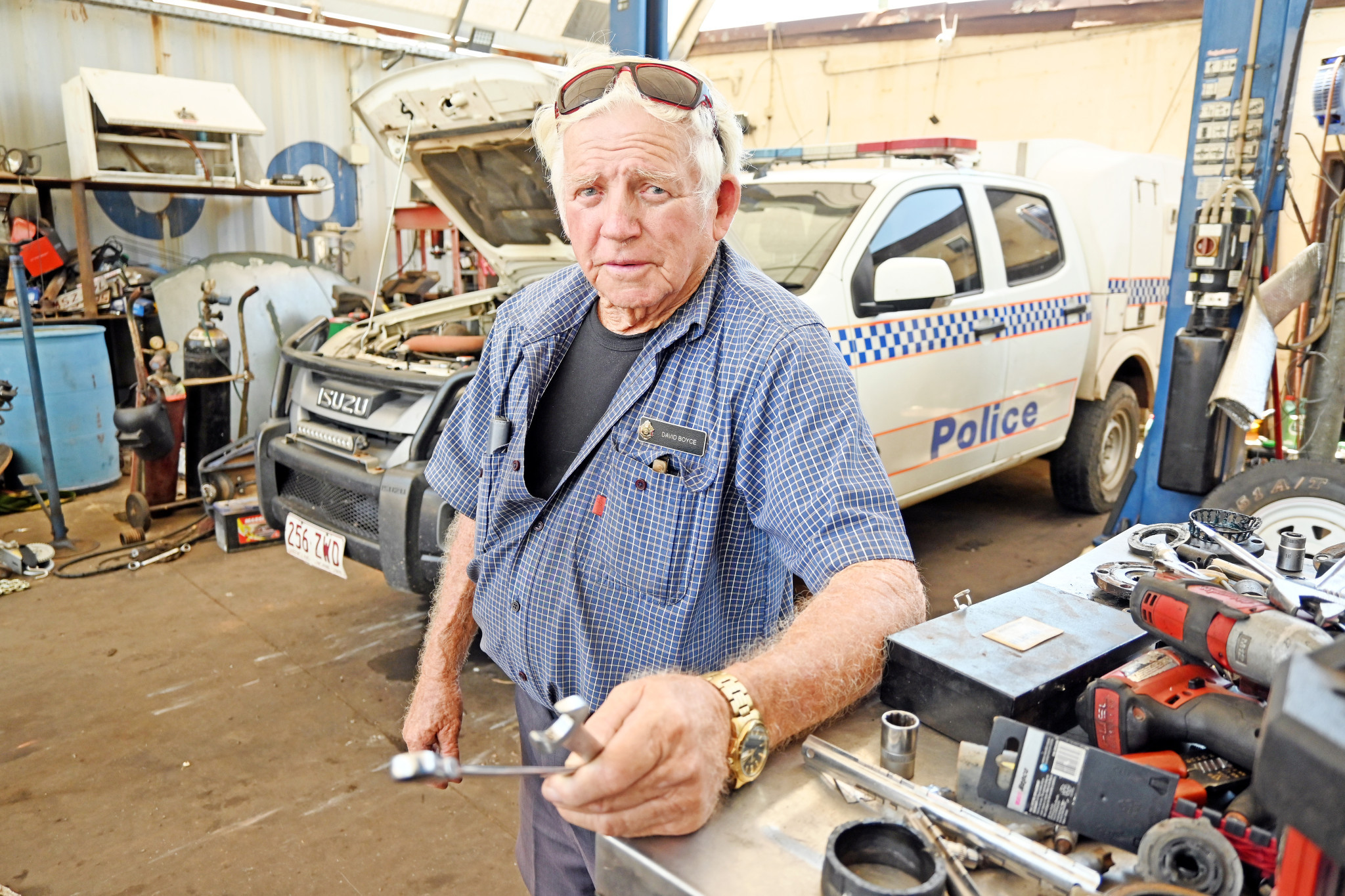General News
26 March, 2025
Meet Mount Isa police's Mr Fix It
David Boyce is one of the unsung heroes at the Mount Isa Police Station.

For more than 20 years, David Boyce has had the thankless task of ensuring the fleet of police vehicles in Mount Isa can respond to an emergency at a moment’s notice.
The 82-year-old former jockey and miner is one of many support workers at the station who ensure the men and women in blue can focus on maintaining law and order in the city.
David is not a formally trained mechanic and admits he knows next to nothing about the computer systems that control modern vehicles, but he takes each of the 40-odd police vehicles in the local fleet out for a spin about once a week to look over the basic functions and he is also always the first point of call if there is an incident in one of the cars.
He said chipped windscreens were a common issue and batteries also needed regular replacing as the life was easily drained given the heavy-duty lights, radios and sirens that are installed.
There are also more serious knocks to the vehicles performed in the line of duty that require a specialist.
When there is something wrong that he cannot handle, he knows the blokes in town who can fix it.
David said he had received calls while overseas on holiday from Mount Isa police officers trying to locate jumper leads or wanting to know where they can source a new battery.
“Ex-police cars are usually pretty sought after when they come up for sale at the auctions,” he explained to North West Weekly.
“I think it is because there are blokes like me who make sure they are serviced and kept in pretty good condition.”
Having settled into a familiar routine at the police station, David is also willing to dish out some sage advice to the younger crew of uniformed coppers.
He said some of the police officers leave takeaway containers strewn through the vehicles that need to be cleaned out, while others need to be reminded to bring water on long-distance drives out of the city limits.
David said while he enjoyed the role in the closing years of his working life, he unexpectedly fell into the job.
He was working at George Fisher Mine when it was mentioned to him in passing that there was a job going at the police station looking after the vehicle fleet.
A quick interview on a Monday morning and the job was his.
Talk to David long enough and he will tell you about his younger years, before the police cars and mining machinery, when he was steering top-line racehorses in stables in the northern suburbs of Brisbane.
He was a teenager when he was gifted a pony by a neighbour and taught himself to ride it on a paddock across the road from his family home. He eventually entered the stables at Eagle Farm to train as a jockey.
“I only rode a few races and then I went and got a tattoo and that killed my riding career,” he said.
After one fateful drunken night out with some mates, he awoke to find a large tattoo of a woman being carried away by a bald eagle etched across his forearm.
In the conservative racing world of the 1950s, he was concerned there would be repercussions, so took to wearing long sleeves when at the stables.
It worked for a while until one of the stewards told him during the summer months to wear shorter sleeves.
He pulled at his shirt to reveal the tattoo.
“Oh, you have a tattoo, Boyce?” was the swift reply.
“We don’t like tattoos in this game.”
David said he soon found himself a man without regular rides.
He even went to the doctors asking to undergo skin grafts to remove the tattoo, but it was to no avail.
He took to employment behind the scenes as a strapper and eventually worked with the 1958 Melbourne Cup winner Baystone.
Baystone had entered the Cup as a 10-1 favourite after winning the Hotham Handicap just a few days earlier at Flemington.
David said he put all of his savings on Baystone to win and he walked away with a massive £3000 payday – almost $60,000 in today’s money.
Still a teenager, David used the money to purchase two black-and-white televisions, a true novelty at the time.
One of the screens was for his parents and the other was generously placed on the front lawn of the family home to allow the rest of the neighbourhood to watch.
It was common for there to be six rows of chairs lining the front yard at his parents’ house in the evenings.
The rest of the money went towards a brand new 1958 Holden FC, for which he paid cash, and it began a lifelong interest in cars that continues to this day.